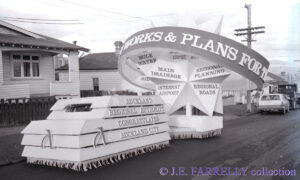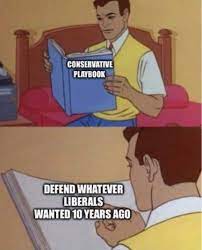1963: Auckland Regional Authority
November 30, 2021
By AHNZ
 Auckland Regional Authority (1963-89) was a great leap forward in centralising political power into the hands of fewer representatives. Communities that wanted to keep their identity and their control over the assets their ancestors had built were right to fear it.
Auckland Regional Authority (1963-89) was a great leap forward in centralising political power into the hands of fewer representatives. Communities that wanted to keep their identity and their control over the assets their ancestors had built were right to fear it.
When Auckland City turned 100 this float was fielded for the 1971 parade. It’s got the Brutalist aesthetic of the 1960s, resembling something crossed between a wedding cake and a spike protein virus enlarged and put on wheels.
The architect of the ARA, Mayor Dove-Myer Robinson, fretted that the globalising concrete sprawl that Auckland was increasingly becoming increasingly dehumanised. Auckland is in search of a soul, he said, as he amputated everything that was soul and replaced it with a government prosthetic!
“Anticipating Super City angst, then-Auckland mayor Sir Dove-Myer Robinson frets that sprawling unruly Auckland is a city in search of a soul.” – NZ On Screen
This float belongs in an Auckland parade the way a tape worm belongs in your brain.
Why Do New Zealanders Permit This?
The Municipal Darwinism of Dove-Myer Robinson and his United Independents ate up more and more communities and homogenised them into itself. The greatest gobbling up in this process so far occurred in 2010 when Auckland became the Supercity. Why do New Zealanders permit this?
“Welcome to Britain’s hidden divide: Anywheres vs Somewheres….two rival value blocs…Anywheres tend to be educated and mobile. They value autonomy, openness, and fluidity. Somewheres tend to be more rooted, less well educated. They value group attachments, familiarity, security. They see the world from particular places. From Somewhere.” – Ref. Goodhart, Youtube (2017)
“We all know people who are Peer Attached and probably went to school with them or have them in our workplace. Currently they are the mainstream and, while they can, work hard to make our shared social and political and media environment more supportive of their reproductive strategy (and toxic to the opposition’s.) These have been hard years to live in for the K-selected Kiwis who Attached to parental figures and seek to Attach to their own children too.” – Slave Culture and Abortion, NZB3
“Could anything be devised more utterly foolish than to salute an inanimate, useless piece of drapery in the same manner as an intelligent human being …?” – Kirikiri School Headmaster James Murray who was fired during the K-selected (and Jingoistic) early 1900s for refusing to salute the New Zealand flag; Ref. Robson (2021); Boer War, AHNZ
“Long ago the country bore the country-town and nourished it with her best blood. Now the giant city sucks the country dry…” – Spengler
Our population fluctuates between different attitudes like a pendulum. Sometimes r-selected cultures (Victimhood Culture and Slave Culture) rule the mainstream and at other time periods it’s K-selected (Honor Culture, Dignity Culture.) Or, to use author David Goodhart’s simple model, we have a season for Anywhere New Zealanders and a season for Somewhere New Zealanders.
Anywhere New Zealanders are peer-attached rather than parent-attached. They are estranged from their parents and their own children too which breaks the continuity of cultural transmission. Heritage and tradition counts for little or nothing to this group and, in fact, they say they are a bit “creeped out” by it1. Jews of the Diaspora necessarily adopt this Anywhere mindset because their identity revolves around non-belonging and absence from what the Maoris call manawhenua (home territory.) Englishman, Dove-Myer Robinson was such an Anywhere Jew and Auckland in his election year of 1968 was in such an Anywhere phase.
 At times like those, with leaders like those, New Zealand takes a step toward the lowering of Social Capital and abandoning in-group preferences. The Somewhere New Zealanders, particularly the rural sector who self-identify with their land, are alienated and even persecuted. Politicians who can champion the Anywheres gain mass approval and the power to come with it which they try to entrench. Another Anywhere politician, Jacinda Ardern, called this entrenchment “change that sticks.”
At times like those, with leaders like those, New Zealand takes a step toward the lowering of Social Capital and abandoning in-group preferences. The Somewhere New Zealanders, particularly the rural sector who self-identify with their land, are alienated and even persecuted. Politicians who can champion the Anywheres gain mass approval and the power to come with it which they try to entrench. Another Anywhere politician, Jacinda Ardern, called this entrenchment “change that sticks.”
The K-selected, the Somewhere New Zealanders, have their day too. However, the two subcultures of Somewhere vs Anywhere are out of balance over the long run in New Zealand’s macroculture. Rather than being a stable homeostasis of harmonious pendulum swings that tick-tock our way of life into the future we tend instead toward entropy. The changes made by Anywheres tend to be retained by the Somewheres when in political power rather than undone. That doesn’t stop the march toward Centralisation and loss of national identity it only ensures that it is a long run phenomena; Two steps forward, one step backward. According to the Theory of Moral Cultures this process has a period of 20 years which gives a decade each for the r and K to have their time in the sun.
In his book, The Status Quo Seekers (1963,) Harold Innes noticed that the National Party had abandoned its manifesto of being a Somewhere force because it had worked out that it could not be elected or re-elected that way. Instead they sought the status quo in whatever form the Anywhere produced it. Meanwhile, the Anywhere culture was moving on to new innovations. The National Party, more or less, simply became the defender of whatever the Labour Party wanted 10 years before.
The trend of New Zealand history is always to destroy what is distinctive and local to replace it with more homogenised and centralised control from afar. We do this to our cities, our provinces, our sports, our newspapers, our libraries, our schools, our governance. If this trend if ever arrested it will be revolutionary. If not, we’ll end up being run as an administrative province from New York if lucky or Beijing if not.
—
1 Ref. Suspicious of Marc Daalder, NZB3 (2021)
Image ref. J.E. Farrelly Collection – photography of Auckland from the 50’s – 80’s; Facebook
 Like Comment Share
Like Comment Share





